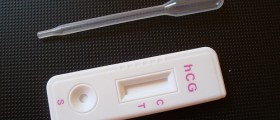
What are the differences between implantation bleeding and ovulation bleeding? To answer this question, we should first examine exactly what an ovulation bleeding is. The decline in estrogen levels that takes place during the middle of your menstrual cycle can cause bleeding, which is sometimes described as an ovulation bleeding. It is true that the decline in estrogen is closely linked to ovulation, but in the majority of women who do have so-called ovulation bleedings on a regular basis, they show up just before ovulation. For some, this bleeding can be a great way of knowing when they are fertile. Like an implantation bleeding, the ovulation bleeding consists of light spotting that you will easily miss unless you are paying close attention.
Like an implantation bleeding, an ovulation bleeding would happen sometime between the onset of one period and the date the next menstruation is due. Ovulation calendars, and even better, charting to conceive using basal body temperature (BBT) can play a key role in knowing what is going on with your body. The main difference between ovulation bleeding and implantation bleeding is not in the appearance of the spotting you experience; it is in the timing of the bleeding.
Implantation bleeding always takes place after ovulation by definition. That is because implantation bleeding is, in fact, the sign that an already fertilized egg is implanting itself into the lining of the uterus, a process that happens seven to 10 days after conception.
An ovulation bleeding, meanwhile, happens just before or possibly during ovulation. Therefore, the answer to knowing what caused your bleeding lies in knowing whether you have already ovulated, or are just before or in the middle of your ovulation. It seems like Mission Impossible to decide what type of bleeding you are having just based on your symptoms. Knowing when you ovulate is the most reliable way of telling the difference between an ovulation bleeding and an implantation bleeding.
Meanwhile, when you are trying to conceive a baby, it is all too easy to view everything through the lens of a possible conception, and wondering whether the spotting you experienced was an ovulation bleeding or an implantation bleeding might cause you to fail to consider the other options. Bleeding between menstrual periods is considered a reason to consult your doctor, because varied medical conditions ranging from endometriosis to PCOS, and from cancer to miscarriage, can cause abnormal bleeding between periods. If you often bleed between periods, it is important to make a medical appointment.
















Your thoughts on this
Loading...